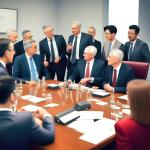This recent decision underscores the balancing act between remote flexibility and the tangible benefits of office presence. While remote work unlocked productivity and freedom for many, firms like Dell and Flight Centre are now emphasizing the importance of face-to-face interactions.
According to discussions sparked by an online memo to Flight Centre’s Australian team, the Brisbane-based company's chief people and culture officer highlighted how critical in-person connection is to their organizational culture. This stance reflects a growing sentiment that physical office environments play a crucial role in fostering teamwork and innovative problem-solving.
NewsWire, which first brought attention to Flight Centre's decision, is awaiting official commentary from the company. Yet, the move speaks volumes about the market sentiment: Corporations are realigning priorities post-pandemic amidst a backdrop of shifting societal norms.
Similarly, Dell's approach supports this transition. Though detailed internal communication is not publicly available, it's apparent that Dell joins a suite of firms investing in a hybrid working model. This often means balancing remote perks with structured office days, aiming to nurture company culture and strategic alignment with business goals.
- Collaboration Dynamics: In-person interactions can enhance community feel and cooperation among teams, leading to more creative outcomes.
- Corporate Unity: Being physically present boosts engagement and can foster stronger alignment with company visions and objectives.
- Mental Health Considerations: Workforce research suggests that regular office days might help combat feelings of isolation among employees operating remotely.
While some employees may feel this transition as a step back from flexible work arrangements, enterprises argue that structured office routines support long-term productivity and even career development.
Dell and Flight Centre are navigating these challenging waters by reincorporating traditional office culture, a dynamic watchlist trend for other industry giants wrestling with similar decisions.
Published: Monday 7th October, 2024
Last updated: Monday 7th October, 2024
Please Note: If this information affects you or is relevant to your circumstances, seek advice from a licensed professional.










